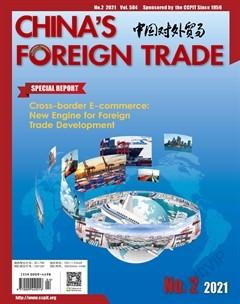Cross-border E-commerce:New Engine for Foreign Trade Development
By Lily Wang
The COVID-19 pandemic has stimulated the digital transition of global foreign trade and Chinas cross-border e-commerce has been growing markedly. Data shows that the total foreign trade carried out through cross-border e-commerce amounted to RMB 1.69 trillion in 2020, up by 31.1% from the previous year.
“Cross-border e-commerce” became a heated topic at the “Two Sessions” for a third consecutive year. The national government keeps expanding the scope of cross-border e-commerce comprehensive experiment zones. Recently, the Ministry of Commerce has worked with another five departments to issue the Notification about the Expansion of Cross-border E-commerce Retail Import Pilot Zones and Strict Implementation of Regulation Requirements. The pilot area of cross-border e-commerce retail imports will extend to all the cities and districts with free trade experiment zones, cross-border e-commerce comprehensive experiment zones, comprehensive bonded areas, import trade promotion innovation demonstration zones, and bonded logistics centers.
Accelerating the development of new business models in the cross-border e-commerce industry is conducive to improving the level of opening-up, promoting the stable growth of foreign trade, and increasing consumption and employment. Cross-border e-commerce has increasingly become a new engine for Chinas foreign trade development.
- China’s foreign Trade的其它文章
- Chinese Elements Highlight the Charms of Fashion
- Post-epidemic Demand for Talent Illustrates New Trend
- The Number of Overseas Students Returning to China Has Doubled
- Insight into the Trends in Chinese Enterprises Affected by the Pandemic
- China and Thailand Discuss Innovative Investment Online
- Feet Firmly on the Gas Pedal in GBA

